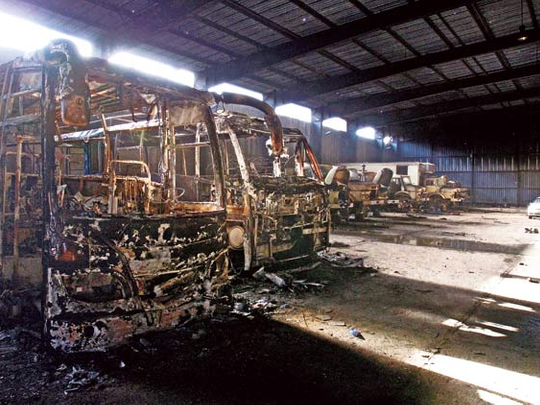
Bayda, Libya: The departure sign over the only gate at Al Bayda Airport has a neat bullet hole through it, little capillaries of glass spiralling outwards from where the bullet had done its work.
Beside the X-ray machine, thick green woollen blankets lie, stained brown with blood. Lots of it. Thick, sweet, brown decaying blood, some in thickened pools, some smeared across the linoleum flooring, more sprayed up the walls.
It reeks of death.
It was at this departure gate that an unknown number of workers at this regional airport were executed by pro-Gaddafi forces. They died here, exiting this world at the departure gate, their flight to the next amidst blank boarding passes, excess baggage labels and green woollen blankets — little comfort on those last terrifying moments.
Countless others from the airport were taken as hostages back to Tripoli on the same planes that brought Gaddafi's mercenaries to fight kill, butcher his own people. After two days of fighting, the airport fell into the people's hands, a hundred or so of the Gaddafi forces taken into custody and held at a secret location.
They are mostly all from the south of Libya, rounded up from military units and told they were going on a holiday. When they landed here, they were told to kill their own countrymen.
Al Bayda is a beautiful place, on a tiered and green plateau overlooking the Mediterranean and Apollonia, the ancient harbour of Cyrene. It is a place few outsiders have seen these past 40 years of Gaddafi's regime.
Robert De Niro and Meryl Streep both came here on a special visa from the government in 2005, with De Niro being overwhelmed by his beauty and ruins.
There are many ruins in this land settled first in 631BC. The Greeks came first, then Romans, the Byzantines, then Islam. But the latest ruins have been left by Gaddafi.
In the centre of Al Bayda, a large military complex sits, a warehouse of arms, tanks, weaponry. There are Roman ruins too, but no scholar was allowed access to see them. That military complex was liberated last week after a four-day battle.
Inside, tanks sit rusted, twisted, charred. More than 500 uniforms lie in a jumbled damp bundled, discarded quickly by the men who used this to keep the local population under control under Gaddafi's reign of terror.
Like the missing from the airport, they too have disappeared According to a senior leader of the revolt, he knows of 3,000 who are missing, disappeared, vanished during Gaddafi's reign of terror. The hills of Cyrene are peppered with the tombs of the rich over the past 2,700 years. Yet there are no graves today of those who disappeared during the Gaddafi years.
Scholars feared that Gaddafi too would bulldoze or destroys the theatres, temples, ruins of the ancients who made this place home. They feared he would destroy them as the Taliban destroyed the Buddhas.
If there is a lesson in history, it is that empires rise and fall. This is the fall of the empire of Gaddafi, an empire built on the shifting sand of Libya.
Like Nero, Gaddafi fiddles while around him, his land burns. It burns with a belief in freedom. It burns with a desire to rid itself of dictatorship and tyranny. It burns with a belief that the Libyan people, together, can decide their future.
Ancient prosperity
The fields around Al Bayda are fertile and always have been. In 331 BC, Greek inscriptions say that this area, Cyrene, sent more than 400,000 tonnes of wheat to Athens during a famine.
It was a prosperous place. Now, under Gaddafi, it struggles. Few have jobs — at least now they have hope.
In ancient times, this was a place where the wealth was shared. Now, the petro dollars are tucked away in bank accounts in London, Switzerland or offshore sanctuaries.
It was also a place where democracy thrived 2,700 years ago. The Greeks wrote a first constitution here.
Now, it is a place again of government of, for and by its own people. Young men with AK47s stand guard, young boys with whistles directing traffic at roundabouts. Pistols are tucked in waistbands, not as a threat, but in case there will be an attack or a mercenary discovered.
As the hours go by and this land becomes more used to the concept of freedom after four decades, those pistols in waistbands are becoming fewer.
In ancient times, there were cisterns and water pipes and roads. Now, after the Gaddafi period, the slightest rain brings floods. If there is another lesson in history, it is this. Those who do not know of the past are bound to repeat its mistakes.
On hilltops overlooking the ruins of Cyrene sits an art decor villa, once the summer home of another dictator, Gracini, the man who hanged Omar Muktar, the leader of Libya who was 81 when he was hanged.
Mussolini, too, would come and visit .Those brutal men are gone the way of others. It's just a matter of time before Gaddafi follows in their path.
But the third lesson of history is this: the end of one era is the dawn of another.
The green woollen blankets and bloody pools of sweet, brown and decaying human blood cannot sustain a tyrant. This is his final boarding call.












